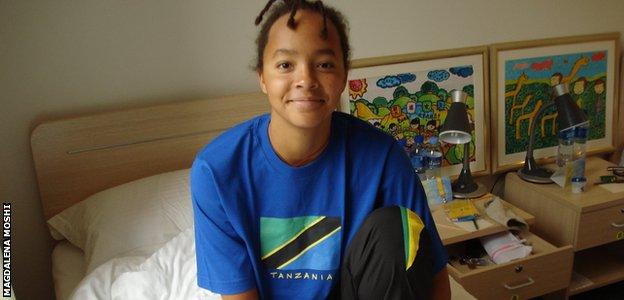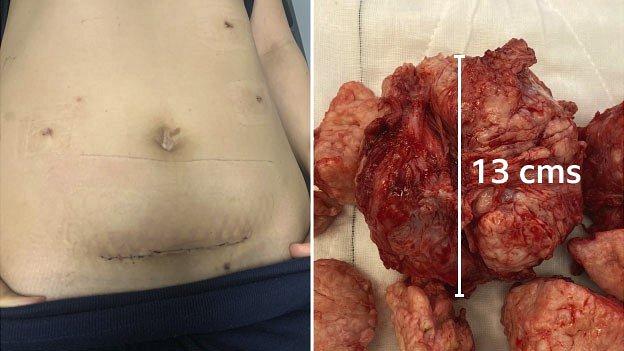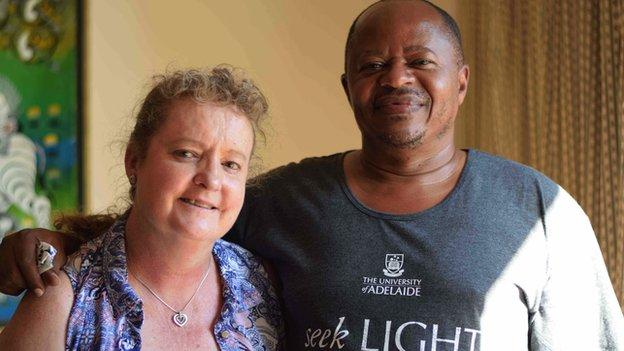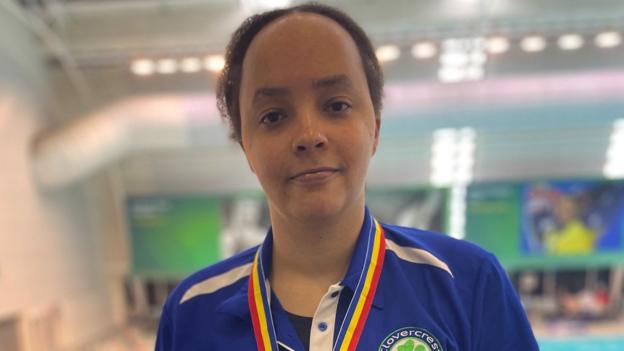This website uses cookies so that we can provide you with the best user experience possible. Cookie information is stored in your browser and performs functions such as recognising you when you return to our website and helping our team to understand which sections of the website you find most interesting and useful.

"For us here in Tanzania, it would have been the end of the world."
The father of Tanzania's first Olympic swimmer is talking to his daughter, confessing in truth, as he tries to explain why he hid a condition that killed at least five of his relatives from her.
A condition that - having been left unchecked - sparked a dramatic rush to hospital late last year, whereupon nearly 4 kilograms of fibroids were removed from Magdalena Moshi's body following emergency surgery.
Weeks of pain duly followed the years and decades of discomfort she had suffered since her early teens, suffering a condition that undeniably hindered her swimming career.
So why had Alex, her father, never said anything about the family history of fibroids?
"People can be stereotyped as being infertile," he candidly admitted, before adding. "It is another of those African walls which we have to create awareness about to be able to remove it."
In response, Magdalena is making it her mission to end the culture-induced silence around reproductive health issues in her east African nation.
For it was only while recovering from her surgery, in Australia where she has gone to study, that she learned that the condition, which can be hereditary, has long run in her family.
Despite being regularly taken to hospitals in the Tanzanian city of Dar-es-Salaam with reproductive health issues during puberty, fibroids' stigma meant the possibility Magdalena might have them was kept from her.
"I don't think there is a part of me that will ever forgive the culture for doing that," the 32-year-old told BBC Sport Africa from her current home in Adelaide, Australia.
'The idea is to get you married off'
WARNING: This article contains a graphic image of the fibroids removed from Magdalena Moshi.
Magdalena was rushed to hospital in September 2021after experiencing a crippling pain in her left lower abdomen while in the gym.
"I remember the first thing I heard when I woke up was the anaesthetist saying 'That tumour was big - it went up to your rib cage!'" recalled a woman pursuing a PhD in health sciences.
As she was to learn herself, fibroids are non-cancerous growths that develop in or around the uterus and which usually develop during a women's reproductive years.
The condition disproportionately affects African women, with Magdalena's doctor saying her African roots meant her 'multiple fibroids were detected quite late'.
"Women of African descent have a two-to-threefold increased risk of fibroids compared to their Caucasian counterparts," Dr Tran Nguyen told BBC Sport Africa.
After she was discharged from hospital, Moshi received a call from her father Alex, in Tanzania, revealing fibroids is a condition that runs in the family and tearfully regretting hiding that from her.
"Understanding why my dad's family didn't discuss the topic was because fibroids are associated with causing infertility, miscarriages and still births - and admitting such things would hamper marriage opportunities," she added.
"The idea is keep quiet about it, get you married off and then you can deal with it at a later opportunity."
Today, Moshi is undergoing a second round of IVF as she struggles to conceive with her boyfriend.

Back in the game
Moshi became Tanzania's youngest Olympian when she qualified for the 2008 Beijing Games at 16.
She also competed at the 2012 and 2016 editions but never made it past the heats as she was regularly fighting not only her rivals but also chronic back pain.
"After the entire situation I learned that a massive symptom of fibroids is back problems," she said.
"So there we go - it affected my flexibility and mobility. How it affected my swimming career, I cannot mentally go back and try to process because it would be too upsetting."
As she recovered from her operation, Magdalena - who still swims competitively - arranged a video call with her father to discuss the issue.
Dispirited by events, she was keen to discover how long her father had known that fibroids ran in the family, why he continued to hide it despite Magdalena showing symptoms during puberty and what lessons the family can take forward.
With BBC Sport Africa allowed to sit in on the conversation, it would turn out that Alex had long been aware of several close family members who had had treatment for fibroids, including two who needed surgeries similar to Magdalena.
"When I was a child, I lost one of my cousins," Alex said.

"So I've known about this issue, and always connected [it] with childbearing. Then I lost more cousins over a period of time, and eventually found out that my mum had similar problems."
When asked why Magdalena's reproductive health issues during puberty and frequent visits to hospitals were not reason enough to reveal the matter, Alex replied: "Some things are not just discussed between father and daughter."
"In our culture, when it comes to marriages, people tend to try to hide their weaknesses. In our society, it used to be the law of survival - which means you always look for the healthiest kind of spouse.
"So for those reasons, a lot of these things have been culturally hidden.
"For my case, it was the ostrich syndrome - when an ostrich is in trouble, it just hides its head in a dark place, hoping the other parts of the body are safe. I was hoping that we'll be right. We never were."
Swimming against the current
The experience has prompted Alex to rethink his connection with the long-standing culture of denial and silence in Tanzania.
He is breaking the taboo and has spoken to all young women in his extended family to go and be checked if they are at risk of developing fibroids or other reproductive health conditions.

He has even taken his campaign to the family's village, which lies at the foot of Mount Kilimanjaro in northern Tanzania.
During their call, Alex told Magdalena that her death as a result of fibroids would have been the "worst consequence" - but that being unable to have children would have been a "major disaster".
"So how did you feel when you got the news that one, the fibroids had returned and two, that I had to undergo IVF (in vitro fertilisation) because of this?" Magdalena followed up.
"I was lost for words."
Magdalena is not however, and says she will continue to advocate for open conversations about reproductive health across Africa.
After her own troubles, she swiftly contacted relatives who could be suffering similarly - and also, unwittingly, silently.
"I called my female cousins, told them I have this condition and that they all need to be checked," she explained.
"My message to younger women across East Africa and the continent is: if you have reproductive health struggles, it doesn't make you any less of a woman - so talk about it and get help."
Having successfully avoided the fate that befell the less fortunate members of her family, Magdalena is taking a deep dive as she hopes that raising awareness of fibroids in Tanzania and beyond can help others by hopefully breaking the stigma.
A stigma which meant she was often swimming with one hand behind back her back, both in sport and in life.
"It put my long-term health, my life and my ability to have children in great jeopardy."



 Africana55 Radio
Africana55 Radio 
